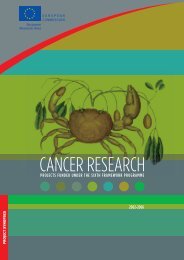I527-290 ESRIF Final Report (WEB).indd - European Commission
I527-290 ESRIF Final Report (WEB).indd - European Commission
I527-290 ESRIF Final Report (WEB).indd - European Commission
You also want an ePaper? Increase the reach of your titles
YUMPU automatically turns print PDFs into web optimized ePapers that Google loves.
11. Working Group: Human and Societal<br />
Dynamics of Security<br />
11.1 Introduction<br />
Throughout Europe serious rethinking about security is underway.<br />
Traditional security concerns are combined with revised notions of the<br />
consequences of living in Risk Society. Several types of antagonistic<br />
threats, natural and man-made disasters are likely to be faced in Europe<br />
over the foreseeable future. States are developing novel practices<br />
for dealing with security challenges from abroad, at home and not<br />
least within its inter(national-do)mestic sphere. The trans-boundary<br />
character of the novel threats of the future will aff ect both the<br />
security challenges faced and our abilities to meet them in eff ective<br />
and legitimate ways. Research based knowledge and innovations in<br />
technology are needed to underpin reform eff orts in this fi eld. For a<br />
variety of reasons, an emphasis on societal security will be central to<br />
the success of this eff ort.<br />
The concept of societal security has several dimensions. Its successful management requires a coordination and integration of<br />
a range of diff erent professional traditions of safety and security at home, abroad and in-between. Organisational and mental<br />
barriers will slowly erode across jurisdictional, sector based and professional boundaries. This dynamic has been experienced<br />
in many other spheres of <strong>European</strong> integration, including in areas with traditionally fi rm nation-state jurisdictions.<br />
11.1.1 Cross-cutting themes that need coordination across the work of <strong>ESRIF</strong><br />
The <strong>ESRIF</strong> working group on Human and Societal Dynamics of Security (WG11) focuses on important societal related research<br />
that cuts across the mandates of all working groups. Technology can only be part of the eff ective response to security threats<br />
and must be applied in combination with organisational processes and human intervention. Solutions shall need to be multidimensional<br />
taking into account the diff erent experiences and approaches to life across Europe.<br />
The <strong>ESRIF</strong> research agenda aims to build new knowledge and technology about responses to mid term and long term threats<br />
and challenges to <strong>European</strong> security. The working group also aims to infuse the other suggested research and technology<br />
development programmes of <strong>ESRIF</strong> with human and societal aspects to help guide the development of both proposed<br />
technologies and resulting policies. For this second purpose, a Transverse Committee has been established under the<br />
leadership of Ms. Sadhbh McCarthy.<br />
This group played the central role of identifying common interests, aims and premises for the work of the <strong>ESRIF</strong>. It developed<br />
themes that link together the many aspects of security research in <strong>European</strong> societies. It clarifi ed shared social, cultural and<br />
political foundations and articulated the wide interests of various stake-holders in security innovation. These settled on a shared<br />
set of ambitions for the advancement of <strong>European</strong> values in a new security environment. The group formulated a number of<br />
<strong>ESRIF</strong> key messages that have been adopted in the <strong>Final</strong> <strong>Report</strong>. Also, the <strong>ESRIF</strong> priority research topics, presented by the eleven<br />
working groups, were clustered and linked to these key messages in order to ensure the coherence of the <strong>Final</strong> <strong>Report</strong>.<br />
Among the cross-cutting concerns raised by this group has been the question of the aff ordability and usability of proposed security<br />
solutions. These can best be understood as a triangle of mutual dependency between advancing Technology, the possibilities and<br />
restraints of Human factors and increasing Organisational complexity. In order to enhance societal security all three dimensions must<br />
be integrated and scrutinised together well in advance of new research and technology developments are under consideration.<br />
229

















